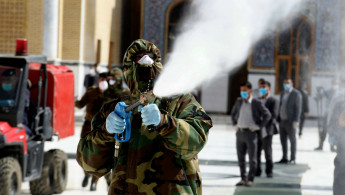Iraqi pilgrims test positive for coronavirus, highlighting fears of widespread outbreak in Syria
The new cases also highlight allegations that the virus has spread further and wider in Syria than previously disclosed. Damascus has reported ten confirmed coronavirus cases, including one fatality.
The new coronavirus has been confirmed in at least 11 pilgrims who recently returned from visiting a shrine in Syria to the holy Shia city of Karbala last week, Governor Nusayif al-Khitabi said.
"Everyone who recently returned back from Syria has been quarantined to make sure he's not infected with coronavirus," the governor said in a Facebook post according to Reuters.
Khitabi criticised the government over the cases, saying Baghdad should have included Syria on a list of countries from which Iraq banned entry to travellers.
Four other cases of the Covid-19 illness were recorded in Iraqi pilgrims returning from Damascus to the Shia holy city of Najaf, health officials have said.
Iraq has so far recorded 547 coronavirus cases, including 42 deaths. Most of the fatalities occurred in the last week.
Fears of a large-scale outbreak in Syria
Syria announced its first death from the novel coronavirus on Sunday.
The health ministry said the woman died "as soon as she was admitted to hospital", and was posthumously tested for the coronavirus.
|
|
In addition to the death, Damascus has reported nine other Covid-19 cases.
But speculation is rife that the Syrian regime is covering up the true number of cases.
Thousands of pilgrims continue to arrive in Damascus from Iran, a regional epicentre for the coronavirus pandemic where more than 2,600 people have died from the Covid-19 illness.
Tehran is a key backer of Syrian President Bashar al-Assad.
Travel from Iran has been blamed as the key factor in coronavirus outbreaks in a number of countries in the region.
It "has been clear for a few weeks that there were numerous very likely cases in hospitals and that it was being lied about", Emma Beals, editor at Syria in Context, said in a tweet.
Omar Abu Layla, director of monitoring site DeirEzzor24, said there have been several reported cases of the disease among Iranian militias that control parts of the eastern provicne of Deir az-Zour.
"The people in Deir az-Zour are in a state of fear and know that the Iranian militias are the ones who brought it there, especially as they are moving with ease between Iran, Iraq and Syria."
The healthcare systems in war-ravaged Syria and Iraq are ill-equipped to handle the large-scale spread of the virus.
Fears are even higher for the country's most vulnerable community - some three million refugees living in squalid conditions in the northwestern province of Idlib.
 |
| [Click to enlarge] |
As many as 100,000 people could lose their lives in the event of a coronavirus outbreak, Idlib's health authority has warned.
The province has only 105 intensive care beds and 30 ventilators due to airstrikes on medical facilities, the health directorate said.
"Our ventilators are always 100 percent occupied and we don't have one single bed ready for a corona case today," Dr Munzer al-Khalil, head of the directorate, said in a statement last week.
"Camps are the perfect breeding ground for the virus and 400 percent overcapacity, with ten or more people sharing one tent. People don't have enough water for drinking, let alone washing their hands."
Follow us on Facebook, Twitter and Instagram to stay connected





 Follow the Middle East's top stories in English at The New Arab on Google News
Follow the Middle East's top stories in English at The New Arab on Google News
![The UAE is widely suspected of arming the RSF militia [Getty]](/sites/default/files/styles/image_330x185/public/2024-11/GettyImages-472529908.jpg?h=69f2b9d0&itok=Yauw3YTG)
![Netanyahu furiously denounced the ICC [Getty]](/sites/default/files/styles/image_330x185/public/2024-11/GettyImages-2169352575.jpg?h=199d8c1f&itok=-vRiruf5)
![Both Hamas and the Palestinian Authority welcomed the ICC arrest warrants [Getty]](/sites/default/files/styles/image_330x185/public/2024-11/GettyImages-2178351173.jpg?h=199d8c1f&itok=TV858iVg)